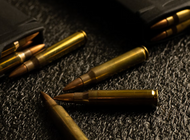Is FMJ Ammo Good For Self-Defense?
May 17th 2023
In the world of firearms and ammunition, selecting the right ammunition for self-defense is of paramount importance. One particular type of ammunition, known as Full Metal Jacket (FMJ), often raises questions about its suitability for self-defense. This article aims to delve into the topic and provide insights on whether FMJ ammo is good for self-defense purposes.
Does FMJ Ammo Stop Enemies?
FMJ ammunition is characterized by a bullet with a soft lead core encased in a harder metal shell, usually copper. The design of FMJ rounds primarily focuses on enhancing penetration. Due to their ability to retain their shape even after striking a target, FMJ rounds tend to penetrate deeply. However, stopping an assailant is not solely reliant on penetration.
While FMJ ammunition can cause serious injuries, its stopping power may be limited compared to other types of ammunition. The key factor in stopping an enemy effectively lies in shot placement. Hitting vital areas such as the heart, lungs, or central nervous system is crucial for incapacitating an assailant, regardless of the ammunition used.
Is FMJ Better Than Hollow Point For Self-Defense?
Hollow point ammunition is specifically designed for self-defense purposes. Unlike FMJ rounds, hollow point bullets feature a cavity in the nose, allowing for controlled expansion upon impact. This expansion results in a larger wound channel and increased energy transfer to the target.
Hollow point ammunition's superior stopping power and ability to incapacitate targets quickly make it a popular choice for self-defense. Furthermore, hollow points are designed to minimize the risk of over-penetration, which is especially crucial in scenarios where bystanders may be present.
Will FMJ Go Through Walls?
Over-penetration is a concern when discussing self-defense ammunition. FMJ rounds, due to their penetration-focused design, have a higher tendency to go through walls or other barriers compared to hollow point bullets. The risk of collateral damage, such as injuring innocent individuals on the other side of a wall, increases with FMJ ammunition.
It is important to note that various factors can influence the penetration capabilities of FMJ rounds, including the caliber of the bullet, the velocity at which it is fired, and the type of barrier it encounters. However, it is generally recognized that FMJ ammunition has a higher likelihood of over-penetration compared to hollow point ammunition.
In contrast, hollow point bullets are designed to expand upon impact, which can reduce the risk of over-penetration. The expansion of the hollow point round causes it to transfer its energy to the target, creating a larger wound cavity and increasing the chances of stopping the threat without posing a significant risk to bystanders.
Real-World Considerations For Self-Defense Ammunition Selection
When it comes to selecting ammunition for self-defense, there are several important factors to consider:
Legal considerations: Before choosing self-defense ammunition, it is essential to familiarize yourself with local laws and regulations regarding ammunition types. Some jurisdictions have restrictions on the use of certain ammunition for self-defense purposes.
Balancing stopping power and collateral damage: Finding the right balance between stopping power and the risk of collateral damage is crucial. While FMJ ammunition may offer deeper penetration, it also carries a higher risk of over-penetration and potential harm to innocent individuals. Hollow point ammunition, on the other hand, provides excellent stopping power while reducing the risk of over-penetration.
Shot placement and training: Regardless of the ammunition chosen, shot placement plays a critical role in stopping an assailant effectively. It is essential to receive proper training and practice regularly to develop the necessary skills for accurate shot placement under stress.
Considerations for specific scenarios: The choice of ammunition may vary depending on the intended use and environment. For home defense, where over-penetration can be a significant concern, hollow point ammunition may be the preferred choice. In other scenarios, such as personal carry or outdoor situations, where the risk of over-penetration is lower, FMJ ammunition may be a viable option.
Conclusion
Choosing the right ammunition for self-defense is a decision that should be made carefully, considering individual needs and circumstances. While FMJ ammunition may have its advantages in terms of penetration, its effectiveness in stopping assailants can be limited compared to hollow point ammunition. Additionally, the risk of over-penetration with FMJ rounds should be taken into account, especially in situations where collateral damage is a concern.
Ultimately, selecting self-defense ammunition requires a thorough understanding of the available options, local regulations, and personal preferences. Seeking professional advice and training from firearms experts and self-defense instructors can help individuals make informed decisions and develop the necessary skills to effectively protect themselves and others in self-defense scenarios.


